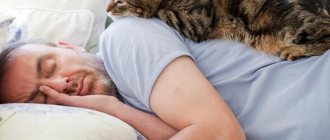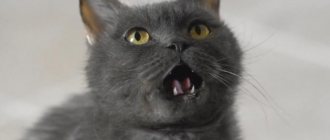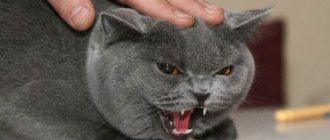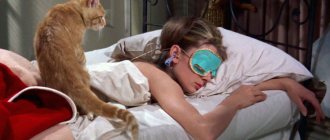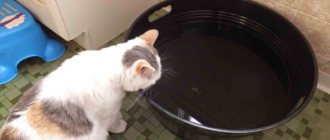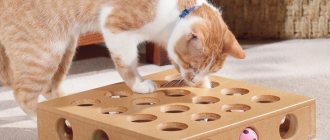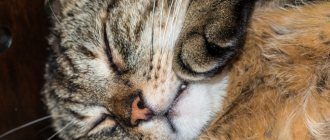Cats are natural nocturnal predators. Therefore, activity in the dark is an absolute natural norm of behavior for them. And the cats don’t care at all that this activity causes trouble for the owner. These animals see excellently in the twilight, so with the onset of darkness the real hunt begins for flowerpots, the owner’s slippers, or a blanket that rises while the owner breathes. But this can be prevented.
Reasons why a cat is awake at night
The pet's activity manifests itself closer to night because it is a predator, albeit a domestic one. His wild ancestors hunted at night. He continued this habit.
Other explanations for nocturnal activity include:
- Demand for food because the owner did not feed the ward enough in the evening. He meows from hunger, trying to get him to give him food.
- Need for communication. He was alone in the house or apartment all day while people were working, and hopes to get attention from them, at least at night.
- Health problems that bother your pet, forcing you to meow.
- The ward slept during the day when no one disturbed him.
Types of tranquilizers and their effects
In the previous section, we already said that sleeping pills are divided into three groups based on the duration of their effect. Let us describe these groups in more detail.
Short term
After taking them, the cat will sleep for 2-3 hours, most often used for transportation, with increased excitability, stress or sleep disorders.
The most effective drugs in this group:
- Xylanite . Available in the form of a solution for injection. Externally it appears as a colorless or light yellow liquid. Has a calming effect on small pets for 1.5 – 2 hours. It also acts as a pain reliever - in this case it acts for 15-30 minutes. The effect occurs on average after half an hour. Xlanit is administered intramuscularly to cats. The dosage is calculated at 0.15 ml per kg of animal weight.
- Intraval . Puts the cat to sleep for no longer than a quarter of an hour. In case of sleep disturbances, it increases its duration. Also used for convulsive seizures. It is introduced into the body intravenously.
- Barbamil . The drug is indicated for surgical interventions or severe stress. It is given to the cat orally. It is advisable to mix the medicine with a treat for the animal. Before use, consultation with a veterinarian is necessary, since the medicine has a number of contraindications.
Medium term
The animal goes to sleep for 4-5 hours. Prescribed for the treatment of serious mental disorders, severe seizures, and also for preparing a cat for sleep.
- Etaminal sodium . The drug is considered harmless to cats, non-toxic. Copes with nervous excitement and stress. The product is addictive, so it should be used with caution.
- Barbital sodium . The animal falls asleep 1.5 hours after administration. The drug is completely eliminated from the body after 10 hours.
- Chloral hydrate . The drug should not be taken by pregnant or lactating cats, as well as pets under six months of age. The drug has an even larger list of contraindications, so its use should begin after consultation with a veterinarian and under his constant supervision.
Long-term
The drugs induce the cat to sleep for 10 hours and are used only during surgical interventions. The drugs are available only by prescription and are used under the supervision of a veterinarian. When using, the dosage must be strictly observed, otherwise the animal may not wake up after sleeping pills.
- Ketamine . In addition to the main effect - a sleeping pill - the drug has an effect on the cardiovascular system: it stimulates the heart, increasing the heart rate and increasing blood pressure. It is administered intramuscularly and intravenously. The medicine should not be used for animals prone to seizures, as well as for procedures that can provoke seizures.
- Ftorotan . It is introduced into the animal's body by inhalation. It must be used with extreme caution, since the wrong dosage can lead to complete cardiac arrest. Anesthesia occurs quickly, without a phase of motor excitation. At the same time, the animal recovers from anesthesia just as quickly.
- Methoxyflurane. The drug is also administered by inhalation. The effect of the drug takes quite a long time, since its components are easily dissolved in lipids. It is used most often when not only a hypnotic effect is needed, but also an analgesic effect.
Important! Medium- and long-term groups of drugs can only be used for a short period, as they are highly addictive.
Remove sources of temptation
Cats like to climb to heights. When the owner is sleeping, the animal can jump from a high place directly onto a sleeping person. To avoid such a situation, eliminate all dangerous places where your pet lives: shelves, cabinets that you can climb on and then jump down. Move dangerous furniture away from your sleeping area. You can put things on top of them that are difficult to jump on and drop.
The measures taken will help wean the cat from performing acrobatic tricks at inopportune times.
Feeding
Read also: How to make a ladybug out of paper
A well-fed pet sleeps more soundly, so it is worth feeding it before bed. Calculate your daily food intake so that you have a slightly larger portion in the evening than in the morning. Then the cat will wake up less at night. You can also buy an automatic feeder that dispenses a portion of food at a certain time. In this case, the cat will leave the bedroom early in the morning and will stop waking up the owner in anticipation of breakfast.
Give your cat plenty of exercise
To keep your pet awake during the day, you need to play with him and take him for walks. You can use toys that imitate the movement of living insects or birds, balls, light bunnies, and pendulum objects.
You need to play with the cat longer until he gets tired. You can “walk” the cat outside before going to bed. Domestic cats rarely run far from home; it is unlikely that they will be lost if their owners are attentive.
Types of sleeping pills for cats - table
| Group of drugs | How does it affect a cat's body? | Name | When to use | How is the medication used? | Can it be used for pregnant cats and kittens? | Price |
| Short acting |
| Xylanite | During diagnostic procedures. | Intramuscularly or intravenously. | No. | From 423 rub. |
| Puts the body into a state of deep sleep for no more than 15 minutes. | Thiopentone | For short-term anesthesia, as well as for convulsive seizures. | Intravenously. | No. | From 1283 rub. | |
| Intraval | From 1000 rub. | |||||
| Having an average effect | It has a hypnotic effect, accelerates the onset of sleep and increases its duration. | Barbamil | Indicated after surgery and severe stress. | Inside. | No. | From 200 rub. |
| Etaminal sodium | It is used as an analgesic and hypnotic in the postoperative period, as well as for psychomotor agitation. | Inside and intravenously. | If necessary. | From 150 rub. | |
| Barbital sodium | Inside. | No. | Removed from sale. | |||
| Chloral hydrate | Inside. | No. | From 50 rub. | |||
| Long-lasting | Puts the pet into a state of anesthesia, which can last from several minutes to several hours. | Ketamine | It is used for diagnostic surgical interventions, as well as for serious injuries as an anesthetic. | Intramuscular and intravenous. | No. | From 1200 rub. |
| Ftorotan | Inhalation. | No. | From 486 rub. | |||
| Methoxyflurane | Inhalation. | No. | Removed from sale. | |||
| Rompun | It is used for diagnostic manipulations, as well as dressings and treatment of postoperative scars. | Intramuscular and intravenous. | If necessary. | From 100 rub. |
Determine the cat's territory
Set up your cat's sleeping place. You can organize a secluded corner for him in a box, or better yet, build several places where he can retire.
Do not train your animal to sleep with you. Feline individuals must know the boundaries of their territory. It is better to close the door to your own bedroom at night. If the cat is immediately accustomed to this order, he will not ask to sleep with the owner or mistress, meowing at the door.
The reasons for the restless meowing of cats at night can be found here:
Medicines for sleep
Sedatives have a certain period of action, which is not always relevant. Even if the animal is relatively calm, a long flight or trip will make it nervous. In this case, it is better to use sleeping pills intended for pets. It can be in the form of tablets, injections or drops. Thanks to them, the animal will sleep peacefully all the way.
The dose size should be determined only by a veterinarian. He calculates the dosage based on the weight, age, breed and other characteristics of the animal. The use of sleeping pills is justified in extreme measures, since an overdose can lead to the death of a pet.
There is a division of sleeping pills according to their duration of action:
- Short-acting agents are the most gentle; they put the animal to sleep for no more than 3 hours. Suitable for small transportation or while handling wool.
- Medium-term muscle relaxants are classified as painkillers and sedatives. They are used in the treatment of seizures, in preparation for anesthesia or in the correction of borderline mental states. They last for about 5 hours.
- Long-term narcotic drugs are used only during surgical and veterinary operations.
There are several other types of sleeping pills for cats:
- Medications are based on chemical compounds. Their effect is more pronounced; they have a serious effect on the body. Such means are resorted to only in serious situations. They can be found in the form of tablets, drops or injection solutions. Pets are very difficult to tolerate the use of medicinal sleeping pills, so they are used only in veterinary clinics.
- Homeopathic - developed on the basis of herbs and is much gentler. That is why they are closer to sedatives than to sleeping pills. They are made in the form of tablets, drops or herbal infusions. Suitable for short trips. Often used to reduce stress, as well as to alleviate the condition of the animal during sexual activity. Such remedies are relevant if the animal has problems with the cardiovascular and respiratory systems. They are also considered more suitable for kittens, older cats and debilitated animals.
Contraindications and side effects
Sleeping pills should not be taken by cats with problems of the cardiovascular system, as well as with abnormalities in the functioning of the kidneys, liver and respiratory tract.
This group of drugs is contraindicated during lactation.
The following side effects may occur after taking sleeping pills:
- weakness;
- hallucinations;
- sleep problems;
- breathing problems;
- failures in coordination of movements;
- low pressure;
- nausea, vomiting;
- problems with stool (most often constipation);
- drowsiness.
Within 24 hours the pet will come to its senses; during this period it eats poorly and practically does not move.
Sleeping pills are a special group of medications. They can cause irreparable harm to the animal if used incorrectly. Therefore, before use, you need to consult with a veterinarian, who will choose the appropriate drug and prescribe the correct dosage. If the situation is not so serious and does not require the cat to sleep for a long time, it is better to use herbal preparations, which are safer for the pet’s health.
Serious reasons why a cat eats poorly and sleeps a lot and is lethargic
However, such a condition may also indicate a serious illness.
Worms
Associated symptoms:
- depressed state for several days;
- a sharp decrease in appetite or its complete absence;
- weight loss;
- disturbances in the functioning of the gastrointestinal tract (constipation, diarrhea, vomiting, flatulence, rumbling);
A swollen belly in kittens may be due to worms
- the coat is dull and crawling;
- swollen, barrel-shaped belly;
- dry crusts in the corners of the eyes without signs of inflammation;
- detection of traces of blood, fragments or whole worms in feces.
Important! If this disease is detected, your pet should be given an anthelmintic drug, the dosage of which is calculated according to the instructions.
Ticks
The bite of this external parasite can provoke piroplasmosis, the causative agent of which, entering the blood along with the saliva of the tick, spreads through the circulatory system in a matter of days and colonizes red blood cells. Its main goal is to weaken the immune system and disrupt the functioning of internal organs. If left untreated, such a bite can be fatal for the cat.
A burrowing tick can spread infection
If the cat is lethargic, sleeps all the time and eats little, has loose stools, vomiting, red urine and fever, you need to urgently examine it for a tick. The detected parasite must be removed, it is better if this is done by a doctor, because along with the tick’s saliva, the poisons and infection contained in it enter the cat’s body. But it is not always possible to quickly go to the clinic. In this case, you will have to remove the tick yourself using tweezers, a thin strong thread or another tool that can tightly grasp the body of the parasite. It is important to grab the bloodsucker as close to the cat's skin as possible and then carefully twist it clockwise.
For your information! A sharp jerk can tear off the body of the tick, and the head, remaining under the skin, will continue to spread the infection. Sometimes, when extracted, small head parts of the parasite remain under the skin, this is not scary, the cat’s immune system can handle it.
After removal, it is recommended to place the tick in a glass jar with alcohol or vodka; in such an environment, the tenacious parasite will die. And if you suspect infection with encephalitis or Lyme, you must deliver the parasite preserved in alcohol to the clinic for examination.
Poisoning
The cat does not eat well and sleeps constantly in case of poisoning, the causes of which may be stale food, household chemicals, medications, rodent poisons or secreted by house plants, etc. Frequent companions are severe chills, difficulty noisy breathing, lack of appetite, digestive tract upset (diarrhea, vomiting), increased salivation. In addition, there is a change in the color of the mucous membranes (reddened, blue or pale) and an increase/decrease in body temperature.
After poisoning, a cat lies a lot and moves little
Intestinal obstruction
This occurs due to the ingestion of small objects, the inability to regurgitate a large hairball, helminthic infestations, volvulus, or the consequences of gastrointestinal diseases.
Note! Owners often confuse obstruction with constipation, trying to eliminate the problem with a laxative, which causes greater damage to the pet’s health.
Pronounced symptoms of obstruction:
- a lethargic and apathetic state, a desire to hide from people and animals, in some cases loud meowing, obsessive following of the owner and attempts to pay attention to the stomach;
- a gradual decrease in appetite until a complete refusal to eat, food intake is accompanied by subsequent vomiting;
- prolonged absence of feces in the tray;
- aggression when trying to touch a swollen abdomen;
- Trying to get rid of gas, the cat rolls on the floor and carefully licks its stomach.
The cat is rolling on the floor due to intestinal obstruction
Asthma
With such a disease, the cat quickly gets tired and does not have the strength to play its usual games. She breathes with difficulty, often and shallowly, whistling sounds emerge in her breathing. The usual posture for an asthmatic is a hunched back, with the neck very elongated in a sitting position. As the disease progresses, apathy and drowsiness increase. If you notice the first signs, you should urgently visit a veterinarian.
You can't help but notice your cat's asthma by its noisy breathing.
Urolithiasis
The first symptom of such a disease is frequent, prolonged and painful urination in the wrong place, which at first the owner may mistake for the pet’s misconduct. The painfulness of the process and resentment for undeserved punishment provoke a change in behavior - the cat becomes sad, phlegmatic and drooping.
As the disease progresses, the pet runs to the toilet more and more often, in most cases not reaching the litter tray, since it can no longer restrain the urge, rapidly loses weight, and more and more blood enters the urine. If you notice an increase in urination and traces of blood in the urine, you should urgently seek help from a veterinarian to prevent the development of an advanced form of the disease and the manifestation of severe symptoms.
Urination posture for urolithiasis
What can interfere with sleep
The neighbor's dog howls at night: what to do, what to do
There are other reasons why an animal behaves this way.
- A cat most often does not allow its owners to sleep due to boredom. The reason may be the pet’s insufficient activity during the day, then it is in the evening that he begins to be awake, wants to play, and thereby prevents him from sleeping peacefully. A cat can jump on its owner while sleeping, and the owner, while asleep, will experience shock. The pet does all this not out of malice, he’s just bored, and has more than enough unspent energy. He needs somewhere to put his energy, especially before the age of 3. You need to play with him a lot, you can buy different balls, balls, lures on sticks and make him play even when he wants to sleep during the day. At least 1.5-2 hours of such frantic activity for young ones and up to an hour for adults, and at night both the cat and the owner will sleep soundly. It is clear that he may not sleep the whole night, then it is important to let the pet know where it is possible to make noise. For example, hiss at him when he starts to get active in the bedroom.
- When a pet is alone in the house all day, he needs attention and communication, he becomes bored, since entertaining himself is not always fun. Therefore, when the owner of the house, at night, the animal believes that this is just the time to pay attention to it and play. It begins to interfere with sleep, sometimes it can even scratch and bite its owner.
- Often the cause of insomnia in cats can be fear or fear of something. For example, a cat sleeps and wakes up from any rustle, this means that it is tense and afraid of something, so it is always on the alert. In such a situation, she will not fall asleep until everyone is asleep. Cats can even be afraid of their owners if they hit her or swing at her. They are very touchy and can be under constant stress because of this. You need to treat the animal kindly.
- Another cause of fear is electrical appliances, for example, a pet saw a vacuum cleaner, hair dryer or mixer at night. He immediately becomes furious and can start meowing and jumping. In this case, you should try not to leave these devices in a place visible to the cat, so as not to provoke him.
- Pets are also very afraid of water, so when their fur gets wet, it loses its warming functions, then the pet walks around the house for a long time, trying to warm up. So it’s better to bathe your cat during the day so that this doesn’t happen at night.
- Waking at night often occurs due to unfulfilled sexual instinct. This means that the cat needs to be sterilized or taken to a cat.
- If the pet is very timid and often hides in a corner when guests come, then at night it tries to regain the attention of its owners and tries in every possible way to attract it.
How not to behave
Of course, the patience of any person is by no means unlimited. Your cat has been treated kindly, fed, watered, neutered - and still continues to scream? Do not rush to grab a broom or, even worse, raise your voice at your pet. Violent measures will not help here. The cat may become frightened or offended, and in this case he may begin to take revenge. It is almost impossible to predict exactly how. Animals are subtle psychologists. They know your most vulnerable spots very well. Rest assured, this will not end peacefully. New wallpaper torn to shreds, puddles in the bed and unattractive piles in shoes are just a small part of what an angry cat is capable of.
Therefore, we kindly request you! – don’t make your life more difficult by punishing him. Try to understand the reason for his behavior and do everything possible to eliminate it.
Age
Little kittens sleep most of the day - about 20 - 22 hours. During this age period, animals have a slow metabolism. All energy consumed is spent on growth.
Sergei Sosedov spoke out against the participation of celebrity children in folk shows The 10-minute cleaning strategy: such work concentrates on a specific task Milos Bikovich said that he wants to marry for love and a Russian girl
At the age of 4 - 5 months, the kitten’s biorhythms are adjusted. The pet grows up and spends about 15 hours a day sleeping.
At the age of 8 - 10 years, the cat begins to age. Her metabolism slows down again. Older animals sleep about 18 hours a day.
